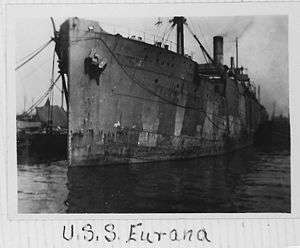USS Eurana (SP-1594)
 | |
| History | |
|---|---|
| Laid down: | 1916 |
| Acquired: | 13 September 1918 |
| Commissioned: | 13 September 1918 |
| Decommissioned: | 9 October 1919 |
| General characteristics | |
| Displacement: | 9300 tons |
| Length: | 410 ft (120 m) |
| Beam: | 56 ft 2 in (17.12 m) |
| Draft: | 26 ft (7.9 m) |
| Speed: | 10 kts |
| Complement: | 70 |
| Armament: | two 4" guns |
USS Eurana (SP-1594) was a cargo ship in the United States Navy during World War I. She was later named Alamar.
Eurana was built in 1916 by the Union Iron Works (later called Bethlehem Shipbuilding, owned by Bethlehem Steel) in San Francisco, California. The time period of construction was from 1 January 1916 to 31 December 1916. She was issued the hull number 120, and released to her new owner, the American South African Line, as a passenger freighter. The U.S. Navy acquired the Eurana on 13 September 1918, commissioning it the same day, with the command going to Lieutenant Commander J. Foster, USNRF. She operated for the Navy under the name USN Eurana, with the Hull # SP 1594, as a Section Patrol Craft. From 4 October 1918 to 14 September 1919, she made 4 voyages from east coast ports to carry passengers and cargo for the Army Expeditionary Force and the Army of Occupation to La Pallice, Verdon, Bordeaux, St. Nazaire, and Brest, France. She was present in Brest on 29 June 1919 to honor President Woodrow Wilson leaving France in the USS George Washington. Eurana was decommissioned from the US Navy on 9 October 1919 at Norfolk, and returned to the Army for transfer to her owner.
As Alamar
Eurana's name was later changed to SS Alamar, and was used in World War II. At Murmansk, on 27 May 1942, Alamar was hit by several aerial bombs on her afterdeck and set afire after Stukas (dive bombers) attacked for one and a half hours. Flames soared high from the high test gasoline stored topside. Alamar fell back from the other ships, out of control, nearly colliding with another injured ship. At 12:30 pm, both ships slipped beneath the water without losing any sailors. Alamar was scuttled.
Loss of Alamar survivors
On 5 July 1942, SS Massmar in Convoy QP 13, with survivors from Alamar aboard, hit a mine after a mistake in navigation led an escort and six merchant ships into Northern Barrage minefield SN72 laid at the entrance to the Denmark Strait.[1] Massmar sank with 17 merchant seamen, 5 Naval Armed Guards, and 26 survivors she was carrying from the sinking of Alamar in convoy PQ 16.[2] 23 of the Alamar crew survived.
References
- ↑ "Mines and Mine Laying in Iceland WWII". Icelandic Coast Guard. Retrieved 22 January 2014.
- ↑ Cressman, Robert J. (2000). The Official Chronology of the U.S. Navy in World War II. Annapolis, Maryland: Naval Institute Press. p. 108. ISBN 1-55750-149-1.
Sources
- USN Ships by Hull Number
- Ships Built at Pier 70, San Francisco
- Photo gallery of Eurana at NavSource Naval History
- Full Text Citations For Award of The Navy Cross to Members of the US Navy
- http://www.wastrust.com/pdf/western_ships_built_list.pdf